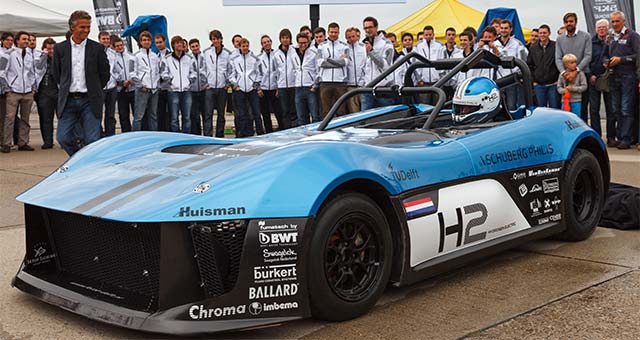
Students of Delft University of Technology in the Netherlands have overcome many technical challenges to finally complete successful tests of their hydrogen fuel cell car by racing for over 40 minutes. The car runs on hydrogen fuel and emits no harmful emissions, just pure water. They're not new to the hydrogen fuel cell game - this is their sixth vehicle design. However, whereas before they were competing in the Formula Student competition, this is their first full sized racer.
It accelerates from stand still to 100 km/h in less than four seconds and could reach a top speed of 210 km/h. Fuel cell power is 100 kW (135 hp), but can be up to 190kW (258 hp) including boost power. The boost power is provided by on board capacitors which can offer a short burst of high power. These are continuously recharged by any excess power from the fuel cell and also any energy from regenerative breaking, also known as KERS (Kinetic Energy Recovery System).
There are two 350 bar, 3 kg, hydrogen tanks onboard. The hydrogen mixes with oxygen in the air to generate electricity within the fuel cell as free electrons result from the reactions. As the fuel is pure hydrogen, the resulting emission from the exhaust is water. Some fuel cells do produce harmful emissions depending on the type of fuel you use, but in this case it is a zero-emission vehicle.
During the test the vehicle ran on hydrogen fuel while maintaining 50kW of fuel cell power and 80kW of traction motor power. Testing the handling in corners, straights, bumps and brake tests were conducted successfully.
Electric vehicles are picking up traction in recent years but the shift seems to be more towards lithium based battery power rather than hydrogen fuels. One of the biggest challenges faced by hydrogen fuel cell cars is the lack of a hydrogen infrastructure. Still, there has been limitted commercial releases of the Honda FCX Clarity and the Toyota Mirai.


